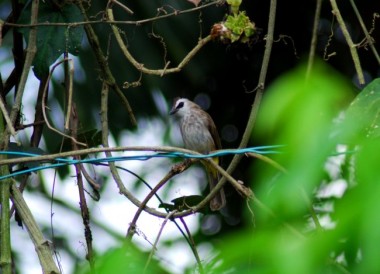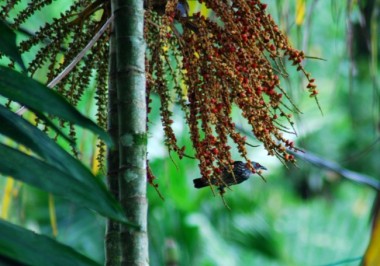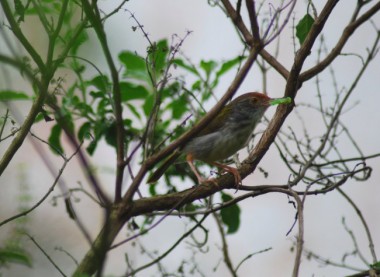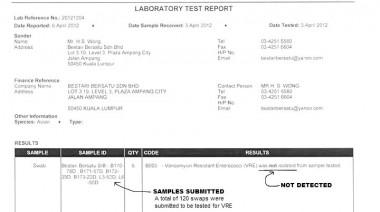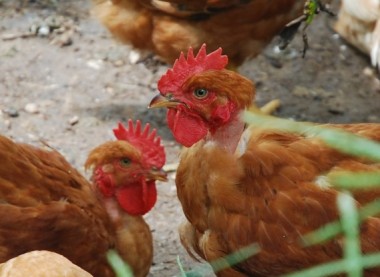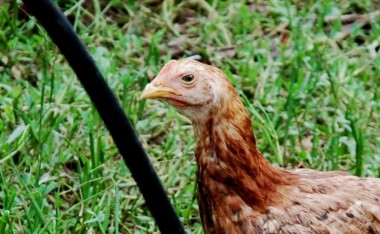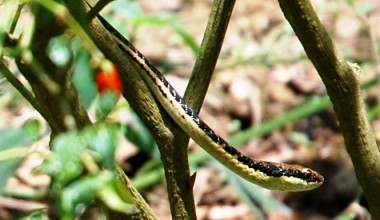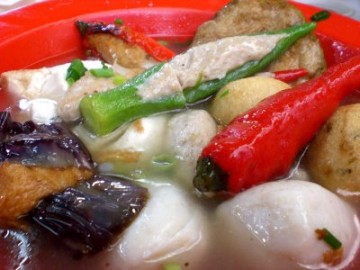Apr 09, 2012
Birds Nesting At Our Farm – I
When birds find your farm environment to be conducive, they become resident and no longer transcient. We can farm and yet we can have a bird sanctuary, sharing just a small percentage of our farming produce with the birds.
It is an honour that many birds, both common and rare have started to nest at our farm. Subsequent generations become increasingly tame and human-friendly.
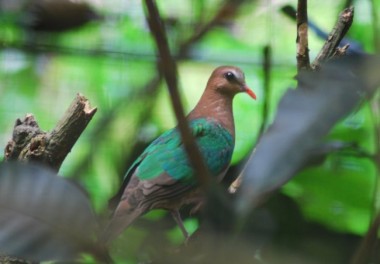
Emerald Dove – two years ago they first started to appear; always flightly. Today they have started nesting at our farm in at least 5 locations.
Click for close up.
Yellow Vented Bulbul – they have nests all over our farm, and subsequent generations are no longer transcient making our farm their permanent home.
Click for Close Up
This juvenile Asian Glossy Starling is part of a flock hatched from nests in our farm.
And our personal favorite, the diminutive Tailor Bird, which goes about its business right next to us without a care. This bird was just 5 feet away from me while I was noisily cutting some brush. How’s that for trust?
13:05 | Permalink | Comments (0) | Tags: punai tanah, emerald dove, starling, asian glossy starling, tailor bird, bulbul, yellow vented bulbul, bird sanctuary
Apr 06, 2012
VRE - Public Health Threat?
Vancomycin Resistant Enterococci (VRE) is often indicative of antibiotic abuse. Farms that use sub-therapeutic antibiotic continuously may have animals that harbor VRE.
VRE have been found in many countries in poultry meat, pork, beef, milk and cultured fish.
VRE poses a potential public health threat.
In 2005, our country reported a case of Community-Acquired Infection (CAI) of VRE. The report is here.
The point of infection is speculative in the report, but it does raise the red flag in so far as the possibility of CAI of VRE is concerned, in our country. This means that the possibility of infection have now moved out from the hospital environment to the community.
In the light of the possibility of community acquired infection of VRE, responsible farmers must do self-monitoring and self-testing to prevent selling meats that are infected with VRE.
All our poultry are tested to be free from Salmonella Enteritidis and VRE before processing. Here’s the test results on VRE in our recent samples sent to the lab :
Click on table for close-up
VRE infection is especially dangerous for those who are immune-compromised, e.g. cancer patients, those with heart problems, kidney problems, etc.
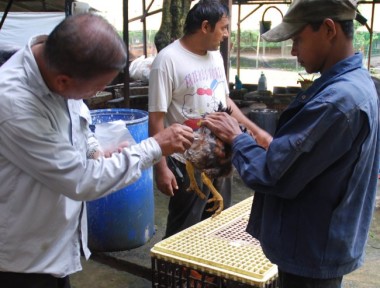
Farm manager Razaly taking a swab.
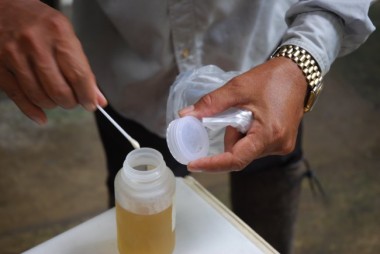
Preserving the samples in BP Water.
Testing samples from the farm is essential to ensure result integrity as samples from processed chickens may reflect cross contamination during handling.
16:52 Posted in Blog, Chickens | Permalink | Comments (0) | Tags: vre, se, salmonella enteritis, vancomycin resistant enterococci, antibiotic abuse
Apr 02, 2012
Living (And Farming) With Nature
The farm is a bird sanctuary of sorts. This statement seems to be contradictory at first sight, but our farm is full of birds of various kinds (about 50 different species at last count). We can farm and yet we can live in harmony with wildlife.
If you want to have birds in your farm, you must not allow your workers to kill any bird, not even one.
Birds living in close proximity of each other will know if one dies, even of different species. A farm like ours is like a huge giant aviary. The birds are regulars, or have made their homes at the farm. If you kill one, all the rest will know of the death. After a few deaths, they will start to leave.
And why kill them? Look at the ‘enhancement’ they contribute to the farm environment:
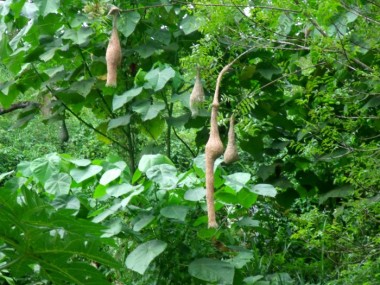
These are nests of weaver birds. They have made them hanging from a neem tree we planted in a chicken padang (field). At the background you can see one that’s green in color. The birds have quickly picked up the grass that we have cut to weave a nest. It will dry out gradually. These nests are the most effective against the many snakes that have made the farm their home too. It’s going to be tough for a regular snake to reach the entrance of the nest.
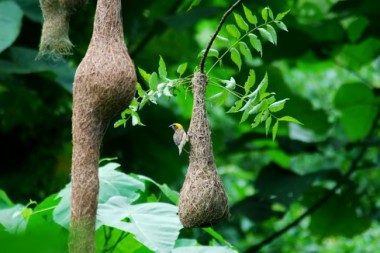
Experts say, birds will bring disease to a chicken farm. This has not been our experience (11 years now). All you need is the will to live with nature, and put to practice modern scientific knowledge about dieases. The costs involved is marginal. The benefits to bio-diversity and the ecology, immeasurable.
Spread the word; it can be done.
10:42 Posted in Blog, Nature Farming, Sustainable Farming | Permalink | Comments (0) | Tags: weaver birds, weaver bird nests, ploceus philippinus, burung tempua, baya weaver, co-existing with nature
Mar 20, 2012
Interesting Trees At The Farm - II
One of my favourite fruits is the Nam Nam, or katak puru (toad).
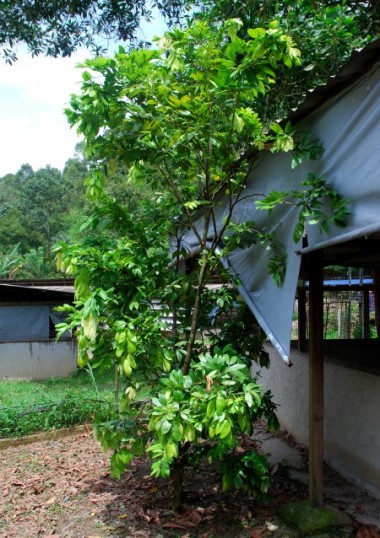
It’s a short shrubby tree, and really quite pleasing to the eye. I can picture it potted in a large pot and acting as a centre piece in a home garden.
The fruits grow on the tree trunk itself; how's that for a conversation piece!
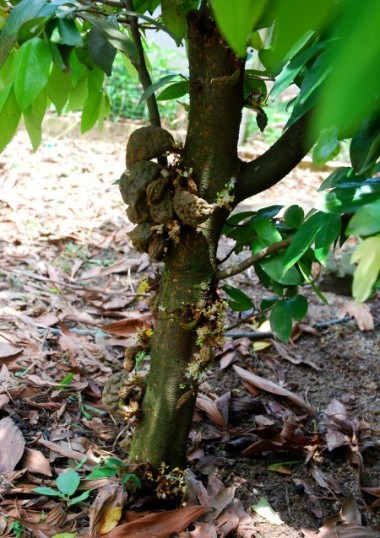
All you need to do is stoop down and pluck off ripe ones.
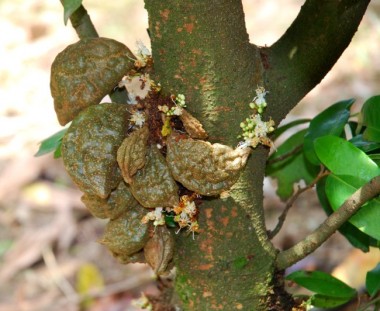
A cluster of fruits
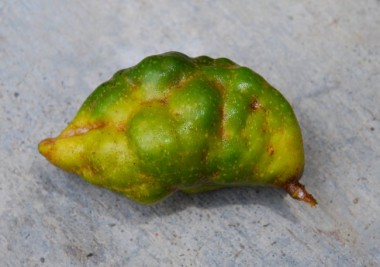
A ripe fruit
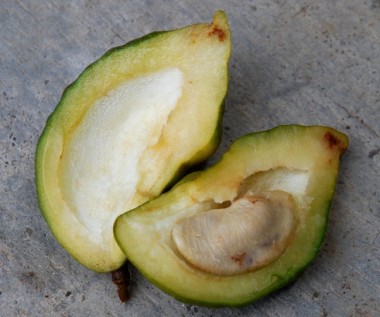
The inside of the fruit.
I like to munch it raw with skin intact. It is tart, sour, sweet, fragrant and crunchy when freshly plucked from the tree. Wait a day, and it looses its crunchiness. Kampung (village) folks say both the fruits, and the leaves made into a tea, aids in relieving kidney stones, diabetes and high blood pressure.
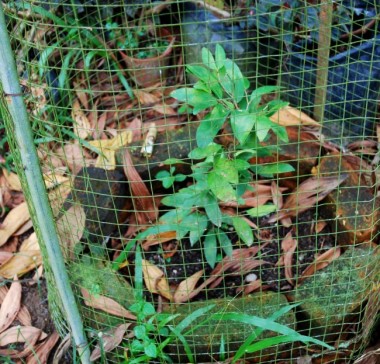
It is easily marcotted / air layered, and almost always survives planting. Nam Nam grown from seeds takes up to 6 years to fruit. I believe marcotted ones should take about a couple of years. We shall see.
18:47 Posted in Blog, Slow Food / Rare Receipes, Useful Plants | Permalink | Comments (0) | Tags: nam nam, katak puru, cynometra cauliflora, rare fruits, heritage fruits
Mar 19, 2012
Interesting Trees At The Farm - I
Finally the kapok tree have fruits and the workers are looking forward to fresh stuffing for their pillows.
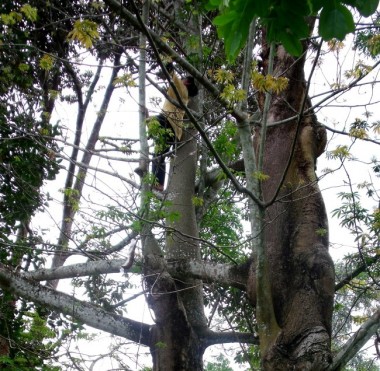
Up the kapok tree shaking the pods (fruits) down.
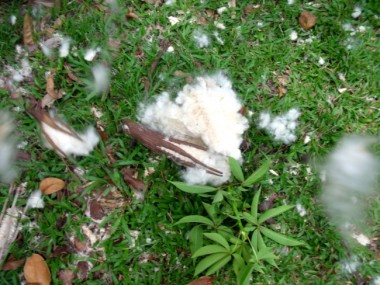
Fallen pods (actually fruits)
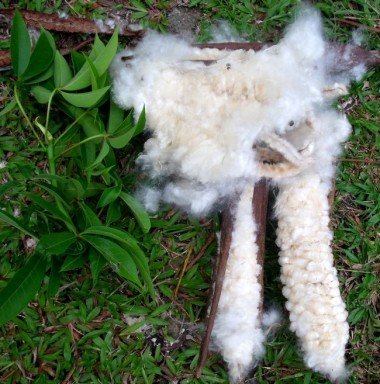
Close up of pods, the fluffy kapok fibre, and leaves.
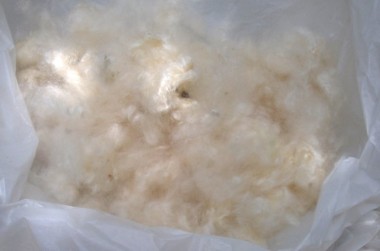
The fibre that will be used to stuff the pillows.
Isn't it time to reintroduce these fibres? They were replaced by cheap material made from petrochemicals. It may be the time now to start bringing these fibres back using modern technology to treat them to last longer etc. A kapok tree can remain productive for 500 years; how's that for sustainability!.
At the farm, we are constantly looking for material found in nature to use and to reuse.
15:10 Posted in Sustainable Farming, Useful Plants | Permalink | Comments (0) | Tags: kapok, ceiba pentandra, sustainable farming, sustainable forestry, income generating forest trees
Mar 09, 2012
Round Eyes, 'Long' Eyes
If you have a few thousand chickens running around, how do you know if some disease is starting?
In antibiotic-free poultry raising, it is extremely important that we catch problems fast. By the time the chicken shows obvious signs, the disease is well advanced and mortality can be high.
One of the fastest way we know of, especially if we are relying on workers, is to go like this first thing in the morning:
Farmer: How’s the chickens in Field Number 10?
Worker: OK, they are eating and running around.
Farmer: Are the eyes round?
Round Eyes
Worker: Most have round eyes. Some have 'long' eyes.
'Long' Eyes
Farmer: Out of 10 chickens, how many round, how many long?
Worker: 8 round, 2 long.
Round Eyes, 'Long' Eyes
20% of your chickens are showing signs of problems. You best head over to the field fast to see what’s the problem. First make sure the ‘long’ eyes is not due to physical eye problems.
Then, sacrifice a few chickens and examine the internal organs. Once you have narrowed down the possible causes, take the necessary action.
11:06 Posted in Chickens, Nature Farming, Sustainable Farming | Permalink | Comments (0) | Tags: free-range poultry, organic chicken farming, necropsy, poultry disease identification, chicken diseases
Mar 07, 2012
Snakes In The Farm - I
Was picking some chilies when we came across this small beauty.
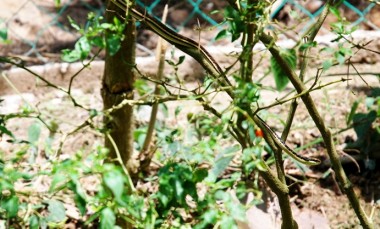
It is a Painted Bronzeback Dendrelaphis pictus, very common in the farm.
Eats frogs, lizards, snails and slugs. Can grow to 3 feet long.
Generally found up low lying trees and bushes, feeding on frogs and snails.
Not harmful to humans.
Every garden should have one or two to keep snails population down.
13:23 Posted in Blog | Permalink | Comments (0) | Tags: rat snakes, non vernomous snakes, dendrelaphis pictus, painted bronzeback, aboreal snakes
Mar 05, 2012
Flowering Enhancers - I
Some of the fruit trees shall be flowering soon. Time to make some flowering enhancers. Fermented flowering enhancers provide potassium and phosphorus, plus microbes to help the plants absorb the nutrients.
We use a large plastic container with a lid.
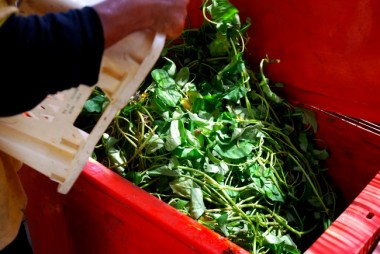
Add 10 kg of kangkung.
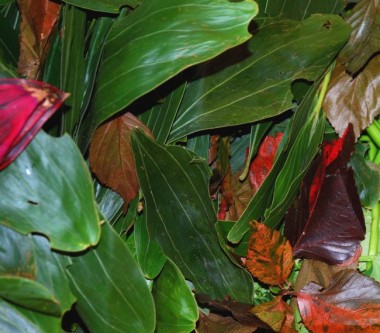
And 10 kg young acacia mangium leaves.
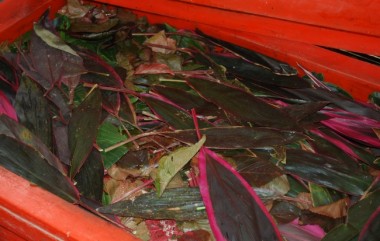
And 10 kg of red colored leaves.
Now add the potassium and phophorus:
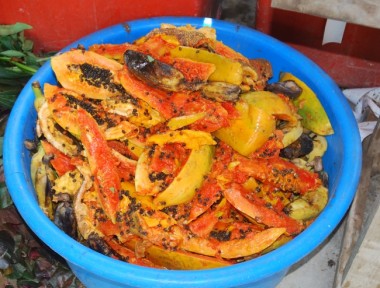
25 kg of papaya and 25 kg of bananas.
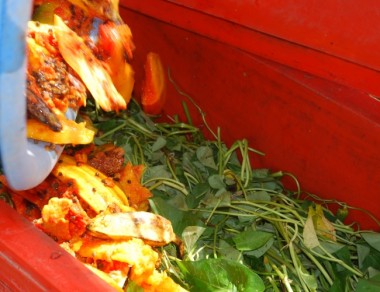
Put them together, leaves at the bottom.
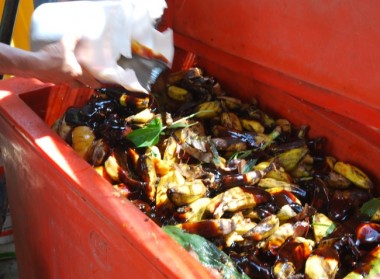
Add some molasses (agri grade, from Pertanian), about 20 kg will do.
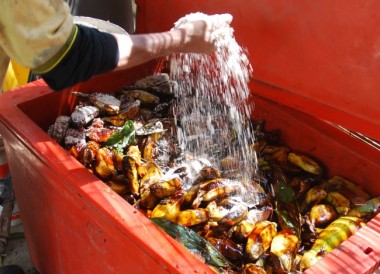
Sprinkle about 500gms quarry (granite) dust into the mix.
Cover with a plastic sheet, close the lid, and let ferment for 30 days.
(To be continued : Flowering Enhancers - II; How To Use)
14:03 Posted in Bio Nutrients, Sustainable Farming | Permalink | Comments (0) | Tags: bio nutrients, em, nature farming, sustainable farming
Mar 03, 2012
Why I Bother...
People ask why I bother. It’s a 24/7 job and rewards, if any, are few and far in between.
Well, let the following information illustrate 'why I bother':
My fasting blood glucose is 4.7mmol/l or 84.7mg/dl.
Recently I bought two fish fillet burgers for a quick lunch. I threw away the buns, just ate the ‘fish fillet’.
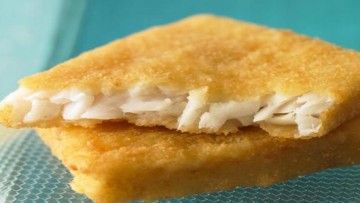
Image from this website
http://www.mnn.com/earth-matters/wilderness-resources/stories/your-filet-o-fish-is-endangered
Half-an-hour later I tested my blood glucose; it went shooting up to 7.6mmol (137mg/dl). Folks, there’s no fish in the world that will do that, and at half an hour at that!
Just what are they really selling to our young kids? For comparison, I ate half a roast chicken recently and my 30mins post meal reading was 5.8 (104.5).
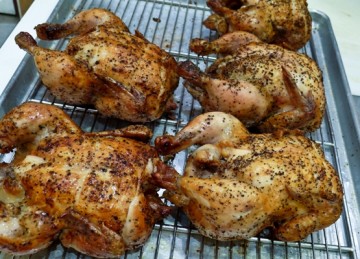
Image from this website: http://www.iamthewitch.com/2010/11/30/chicken-or-pasta/
So what’s going to happen to a kid eating one fish fillet with buns intact, potatoe chips and a large cup of coke? And he does that once or twice a day, day-in and day-out.
Another day I had a cup of Nescafe-si-kosong. That’s Nescafe with evaporated milk, no sugar. It could well be teh (tea) tarik-si-kosong.

Image from:
http://tehtarikgelasbesar.blogspot.com/2009/05/berapa-ramai-yang-buat-segelas-teh.html
After half an hour, my blood glucose was 8.4 (151). That’s no milk you are pouring down your throat 4 to 5 times a day. Can you imagine the havoc you are doing to your endocrine system with this yo-yo-ing through the day? (For my BG to go up that fast, there must be corn syrup or corn flour in that milk). Check the label of the evaporated milk your friendly teh-tarik (tea vendor) man is using. Make sure it is milk and not milk plus hydrogenated soya oil (trans fats) or palm oil plus corn flour, etc. Choose the wrong brand and you are pouring down your throat trans fats and very high glycemic index carbo a few times a day. If the evaporated milk tastes a bit sweet you betcha it contains HFCS (high fructose corn syrup).
It goes without saying what that non-dairy creamer is going to do to your glucose level. And you thought it is a healthier alternative to dairy!
Many weight conscious folks share a common myth – healthy lunch is the neighbourhood yong tau foo (vegetables stuffed with fish paste) store. Well, depending on the store, some will send my glucose level up to 7.5 (135), a really good store will send it up to 6.7 (121) or so. The ones I made at home puts it up to 5.8 (104.5). So, guys that yong tau foo is not as healthy as you thought.
Image from
http://malaysiafood5a12011.blogspot.com/2011/04/yong-tau-foo.html
Why all this emphasis on glucose level? Firstly, it is the easiest to measure and prove what’s wrong with our food nowadays. Second, continuous high blood glucose level is the mother of all degenerative diseases; from premature aging to arteriosclerosis to diabetes.
And folks, your blood sugar level has been high since morning – first, that roti canai (traditional bread made with refined flour, sugar, salt and oils) and teh tarik send it way up. Then three hours later, your mid morning kuih muih (rice cakes and similar rice flour based deserts), your lunch of fried kwai teow (flat noodles made from rice flour), your tea break of pisang goreng (banana fritters), then dinner, rice and curry and all the normal stuff, and after dinner a large helping of the sweetest fruits you can find. And God bless you, a bowl of instant noodle before you go to sleep.
A diet like this, we are not just talking about obesity, we are talking about a whole host of ‘body breaking down’ diseases that will come crashing when you hit your late forties or fifties, if not sooner.
So, our Ministry is trying to reduce the obesity problem by ensuring that only wholesome food is served in school canteens. NOT excluded is filled evaporated milk, NOT excluded is various types of meat patties, fish cakes, with unknown percentages of flour added, etc. NOT excluded is food / drinks made with fructose, or high fructose corn syrup, etc. I am afraid the Ministry is going to fail and the kids are headed for diabetes by the time they reach their forties.

The above image is from this website.
http://mthago.wordpress.com/2011/05/14/obesity-among-school-children-causes-and-treatment/
No, I am not talking specifically about blood glucose or fast food or obesity. I am talking about the need to take control of our food supply and reducing the power of food corporations over our lives. I am talking about authorities placing more emphasis on what the food corporations and corporate farmers are doing, the 'unseens', not the obvious.
The modern-day 'snake oil' salesman calls himself a food scientist, or a food technologist or a bio-technologist.
10:53 Posted in Blog | Permalink | Comments (0) | Tags: blood glucose level, diabetes, junk food, obesity in malaysia
Mar 02, 2012
Sanctuary For Snakes
Our farm is a sanctuary for snakes. And they do good work too, getting rid of rats and other rodents. Our workers are from communities which traditionally kill any snake, big or small, poisonous or not. We have to put up pictures of snakes they should not kill, and snakes they should keep a distance from:
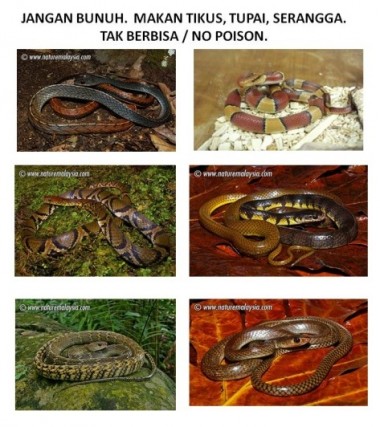
A sampling of the good guys found in the farm.
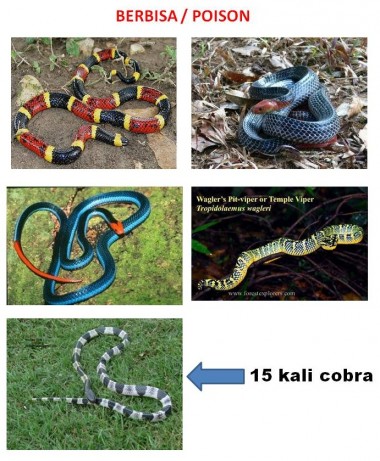
Among the poisonous snakes in the farm is the fifth most venomous snake in the world - Malayan Krait - Blue Krait. It is 15 times more venomous than a cobra.
The snakes are becoming quite used to humans, slithering slowly away when they see us, not at all afraid.
Workers have been trained to let the snakes know of their presence, and how to handle the snakes if they suddenly become aggressive. They have also been trained to handle situations if an emergency occurs.
We hope this will explain why we are reluctant to take on Wwoofers, casual visitors, etc. We have seen visitors just go into hysterics on seeing a snake suddenly appearing right next to them, inches away.
Today, I was reaching out to unlock a gate that I have done maybe a few thousand times. Most days I just reach out without looking. Luckily today, I did look when my hand was almost at the latch:
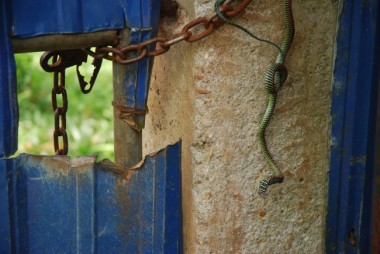
It is a beauty, isn't it.
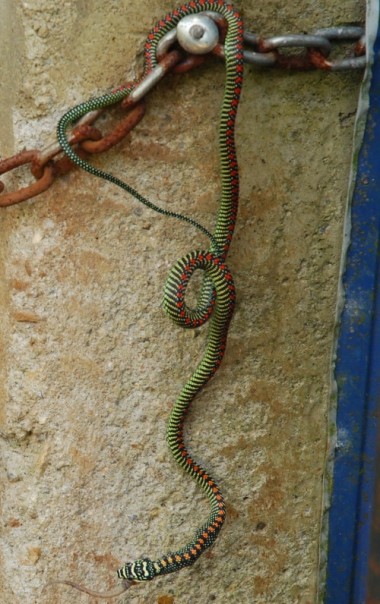
It is a Paradise Flying Snake Chrysopelea paradisi. Mildly venomous. We have seen them gliding from tree to tree in the farm. They like especially coconut trees and other palm trees, especially areca nut palm. The colors of the snake blends well with the tree.
09:43 Posted in Blog | Permalink | Comments (0) | Tags: snakes in farming, paradise tree snake, malayan krait, blue krait








